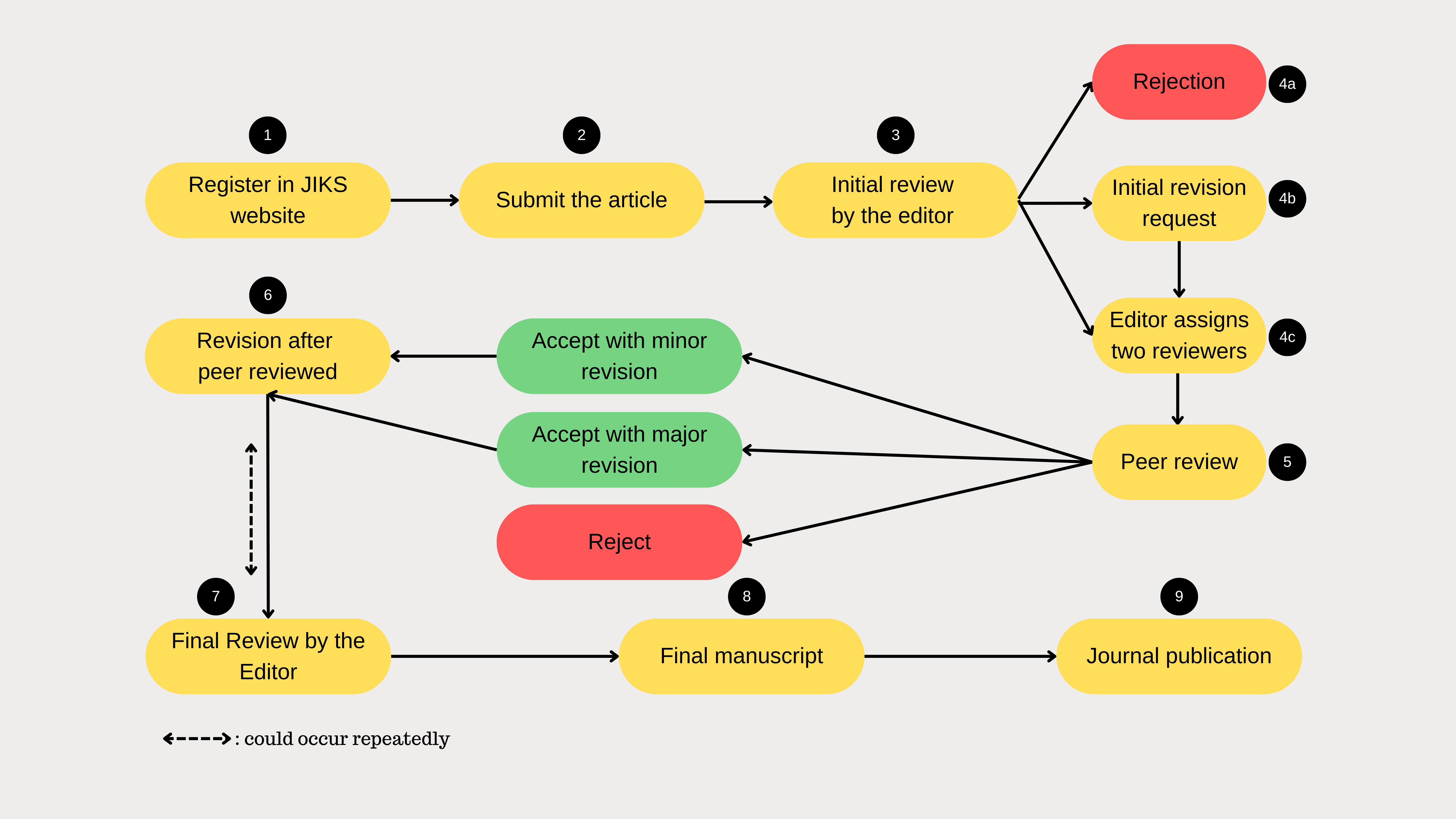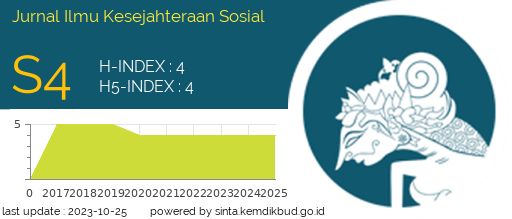Journal Policies
Contents
- Who Can Submit?
- Peer Review Process
- General Submission Rules
- Formatting Requirements
- Publication Frequency
- Open Access Policy
- Publication Charges
- Personal-use Exceptions
Who Can Submit?
Anyone may submit an original article to be considered for publication in Jurnal Ilmu Kesejahteraan Sosial provided he or she owns the copyright to the work being submitted or is authorized by the copyright owner or owners to submit the article. Authors are the initial owners of the copyrights to their works (an exception in the non-academic world to this might exist if the authors have, as a condition of employment, agreed to transfer copyright to their employer).
Peer Review Process
- Jurnal Ilmu Kesejahteraan Sosial adopts blind peer-review, which means that the reviewer(s) and author(s) are unaware of each other's identity.
- All manuscripts submitted to the Jurnal Ilmu Kesejahteraan Sosial are checked for plagiarism using Turnitin.

These are the following steps of peer review process in the Jurnal Ilmu Kesejahteraan Sosial:
- Register on the website of the Jurnal Ilmu Kesejahteraan Sosial and create an account.
- Submit the article manuscript via the website.
- Initial review: The editor will review the manuscript based on its suitability to the aim and scope, systematic writing, and plagiarism (using Turnitin). The similarity index should not exceed 20% and the primary source should not exceed 3%.
- Results of initial revision:
- Rejection: If the manuscript does not match the aim and scope of the Jurnal Ilmu Kesejahteraan Sosial, it will be rejected and returned to the author.
- Initial revision request: If the manuscript has deficiencies in writing or Turnitin test results, it will be returned to the author via email for revision. The revised manuscript can be submitted via the website.
- Assigning reviewers: If the manuscript meets the suitability of the aim and scope, systematic writing, and standard Turnitin test results, it will be passed to the review stage.
- The editor will send the manuscript to the reviewers for peer review. The reviewers will submit the result of the review via the website and the author will be able to access it.
- If the manuscript is accepted with minor or major revisions, the author will be asked to revise it first. The author has to submit the revision via the website.
- The revised manuscript will be reviewed by the editor. If the editor has not accepted the result of the revised manuscript, it will return to the revision stage.
- If the manuscript is accepted without notes by the editor, it will be processed into final manuscripts. The author will receive a Letter of Acceptance (LoA) as proof that the manuscript has been accepted for publication.
- Finally, the final manuscript will be processed for publication.
General Submission Rules
Submitted articles cannot have been previously published, nor be forthcoming in an archival journal or book (print or electronic). Please note: "publication" in a working-paper series does not constitute prior publication. In addition, by submitting material to Jurnal Ilmu Kesejahteraan Sosial, the author is stipulating that the material is not currently under review at another journal (electronic or print) and that he or she will not submit the material to another journal (electronic or print) until the completion of the editorial decision process at Jurnal Ilmu Kesejahteraan Sosial. If you have concerns about the submission terms for Jurnal Ilmu Kesejahteraan Sosial, please contact the editors.
Formatting Requirements
See Manuscript Guidelines for details. It is ultimately the responsibility of the author to produce an electronic version of the article as a high-quality PDF (Adobe's Portable Document Format) file, or a Microsoft Word, WordPerfect or RTF file that can be converted to a PDF file.
Publication Frequency
Jurnal Ilmu Kesejahteraan Sosial publishes new issues in April and October each year.
Open Access Policy
This journal follows an Open Access Policy, which means that its content is immediately accessible to the public, promoting a greater global exchange of knowledge.
Publication Charges
There are no publication charges for authors to submit their manuscript, and readers or institutes can access the content without any charge.
Personal-use Exceptions
The following uses are always permitted to the author(s) and do not require further permission from UI Scholars Hub provided the author does not alter the format or content of the articles, including the copyright notification:
- Storage and back-up of the article on the author's computer(s) and digital media (e.g., diskettes, back-up servers, Zip disks, etc.), provided that the article stored on these computers and media is not readily accessible by persons other than the author(s);
- Posting of the article on the author(s) personal website, provided that the website is non-commercial;
- Posting of the article on the internet as part of a non-commercial open access institutional repository or other non-commercial open access publication site affiliated with the author(s)'s place of employment; and
- Posting of the article on a non-commercial course website for a course being taught by the author at the university or college employing the author.
People seeking an exception, or who have questions about use, should contact the editors.




